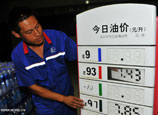
BEIJING, July 20 (Xinhua) -- In freeing up lending rates, China has sent a strong signal that it is feeling its way in the "deep water" of reform, moving toward a more open, market-oriented economy.
On Friday, China's central bank announced the sooner-than-expected removal of controls on bank lending rates, effective on Saturday. It canceled the floor limit for lending interest rates to allow financial institutions to compete for borrowers.
"In general, we believe the macro and micro conditions are ready for further reforms," said a central bank official who spokes to Xinhua on condition of anonymity.
China's gross domestic product (GDP) growth slowed to 7.6 percent in the January-June period, the weakest first-half performance in three years but still above the lower limit that the government will tolerate.
M2, a broad measure of money supply that covers cash in circulation and all deposits, increased 14 percent year on year to 105.45 trillion yuan (17 trillion U.S. dollars) at the end of June.
In response to the government's "de-leveraging" approaches, Chinese lenders were hit by a severe liquidity crunch last month, as indicated by a surge in the Shanghai Interbank Offered Rate overnight rate, a basic gauge of interbank borrowing costs, to an historic high of 13.44 percent on June 20.
Nevertheless, the State Council, China's cabinet, reiterated on July 5 that it would "make steady progress in the market-based reform of interest rates and let the market play a bigger role in the allocation of capital."
Amid a continuous economic slowdown and increasing risks in the financial market, the latest move has reaffirmed the government's absolute determination to secure stable growth and restructure the economy, said Yin Jianfeng, a researcher at the Chinese Academy of Social Sciences, a government think tank.
"Large and medium-sized enterprises with good qualifications will have stronger bargaining power when seeking loans, and in this sense, the move will help stabilize economic growth," said Lian Ping, chief economist with Bank of Communications.
On the other hand, micro and small enterprises, which usually accept interest rates 10 to 30 percent above the guideline rate, will become more attractive to banks. This will ease the credit crunch among small businesses and inject vigor into these job generators, said Lian.
It is also worth noting that the central bank did not ease its controls over mortgage rates, indicating that the government is not pleased with rising property prices.
Out of a statistical pool of 70 Chinese cities, 63 saw month-on-month home price rises in June, down from 65 cities that reported higher prices in May, the National Bureau of Statistics reported Thursday.
As China's economic reform deepens, the former growth pattern that focused on investment and exports was found to be unsustainable, the latest in what experts call the surprising tumbles of exports and imports.
Exports dropped 3.1 percent year on year to 174.32 billion U.S. dollars, while imports declined 0.7 percent from a year earlier to 147.19 billion U.S. dollars, according to the General Administration of Customs.
"Europe is still struggling to recover from a steep downturn and the quantitative easing in the global economy will add to uncertainties," said Zhuang Jian, an economist at the Asian Development Bank.
Investors were calmed by U.S. Fed Chairman Ben Bernanke's testimony to Congress this week. Bernanke told the Senate Banking Committee on Thursday that it was "way too early to make any judgment" as to whether tapering will start in September.
Wary of renewed market volatility, the Group of 20 (G20) nations on Friday pledged to shift policy carefully and communicate clearly as they navigate a path toward recovery.
The latest move by China's central bank left a ceiling on deposit rates unchanged. "That is the most critical and risky part of interest rate market reform as shown by other countries' experiences," said the official with the central bank.
The removal of deposit rate ceilings in the United States resulted in massive bank failures in the 1970s and 1980s.
China's reform of interest rates began in 1996. The central bank has vowed to liberalize deposit rates in a "steadily and orderly" manner.
















 Elder couples celebrate golden wedding anniversary in Hangzhou
Elder couples celebrate golden wedding anniversary in Hangzhou


![]()
